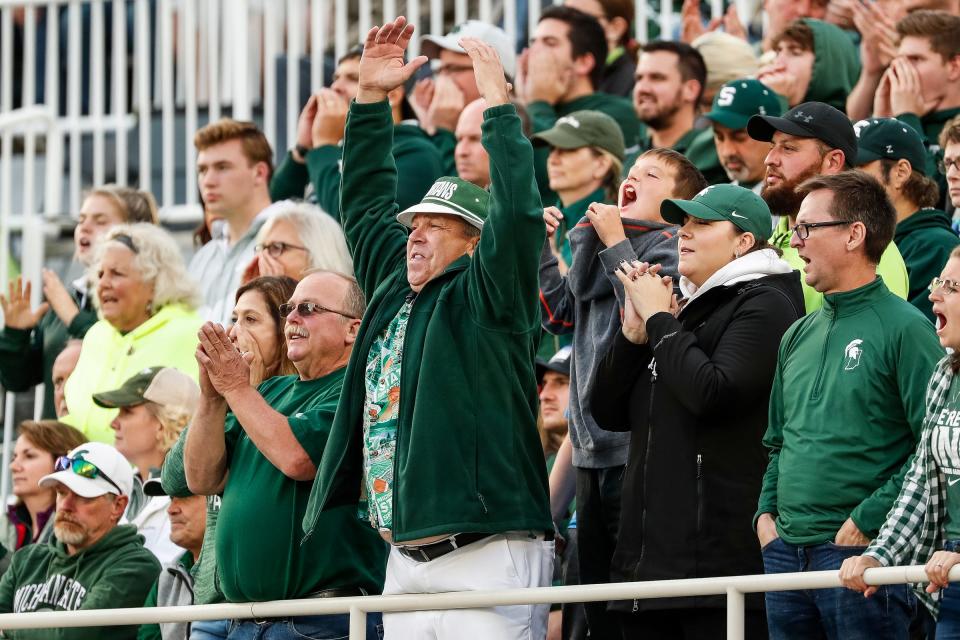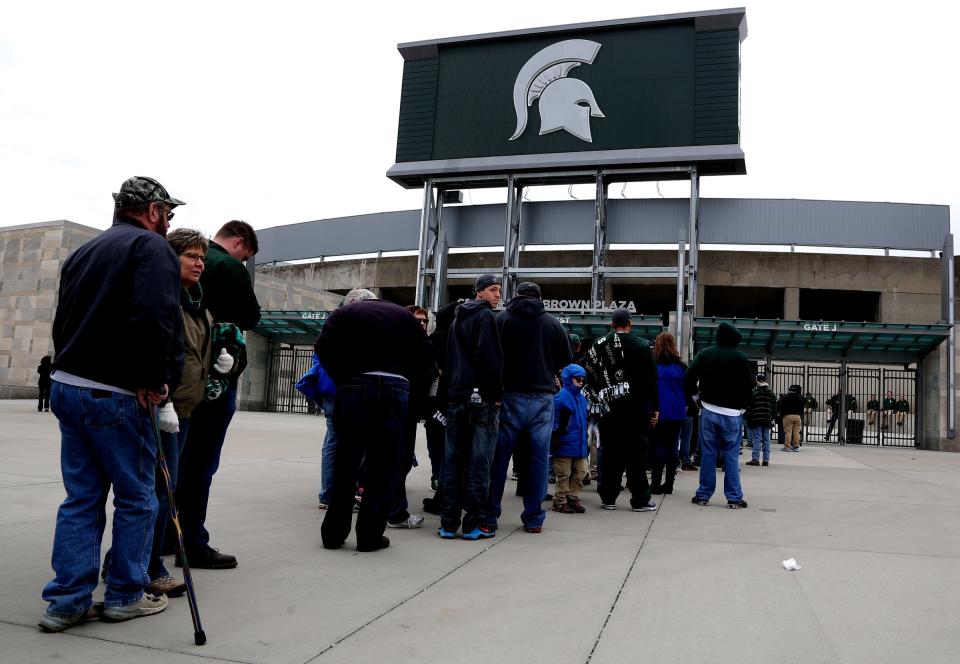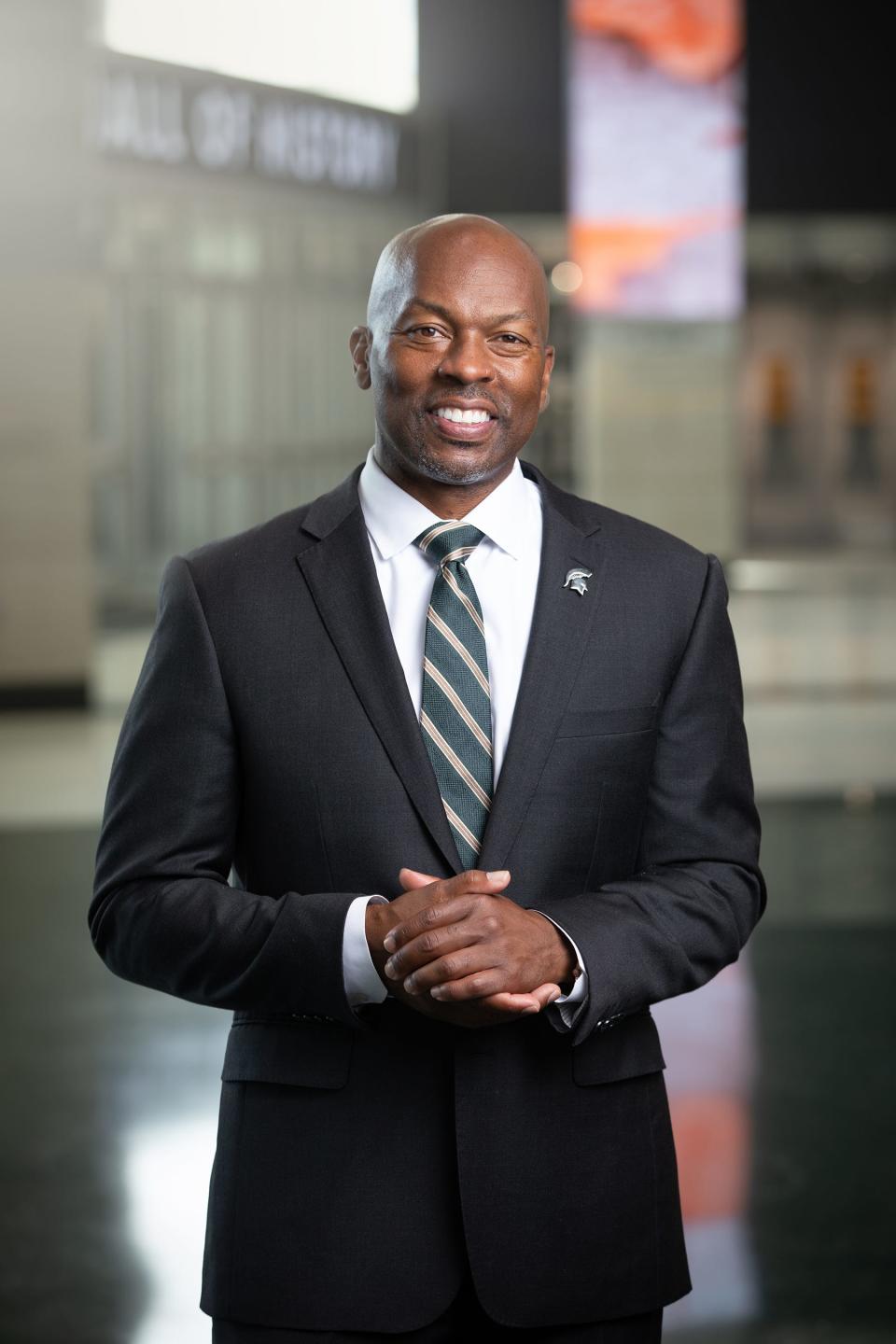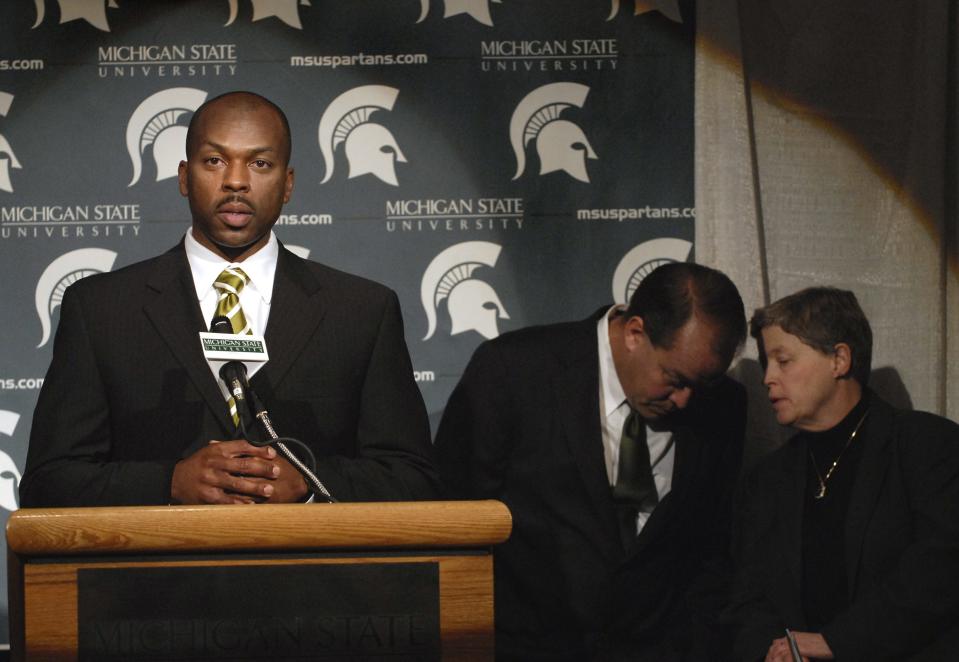Michigan State AD Alan Haller on Big Ten's future: 'Unique matchups' coming soon
EAST LANSING — A little less than a month ago, Bill Beekman tendered his letter of resignation as Michigan State’s athletic director.
It left a void within the athletic department, an empty office at 1855 Place and a leadership vacuum with the university’s sports year beginning in just a few weeks.
It also opened the opportunity of a lifetime for Alan Haller.
The Lansing native quickly became a leading candidate for his dream job, then watched an uneven and sometimes political process play out. And days before MSU hired Haller to become the 20th athletic director in his alma mater’s history, tragedy struck the Spartans.

First, associated athletic director and longtime director of student-athlete support service Jim Pignataro — whose office was two doors away from Haller’s and whose kids grew up with Haller’s — died after a long battle with cancer. Then Friday, MSU rowing captain Olivia Long was killed in a car accident.
Before his first day on his new job, Haller encountered his first significant situations in leadership.
SCOUTING REPORT: Michigan State football at Northwestern prediction
HELLO HALLER: Being Spartans AD 'is not a job. This is my responsibility'
“The last 30 days have been very challenging,” Haller said Thursday, a day after being hired to run the athletic department. “People think the most challenging piece of that is Bill stepping down and then not having an AD. But the most challenging thing happened in the last two weeks. … Those are challenges that this environment brings you. Every single day, you wake up and then there could be something different, from the excitement of winning a great game to the things that we've just experienced.”
And so it was with both immense joy and sadness that Haller — a former two-sport athlete at MSU, NFL player and MSU police officer — began his “dream responsibility.” Day 1 on the job ended with a memorial service for Pignataro, and Day 2 began with his friend’s funeral.
But the new overseer of 21 Big Ten sports, nearly 1,100 athletes and 300 athletic department employees took 40 minutes to answer questions about his vision for the Spartans, the changing landscape of college athletics and how he handles difficult situations.
On becoming athletic director
“Obviously, I was a student-athlete here, I'm from this community, so I'm so fired up. This is something I've wanted to do for the last 10 years. And I'm excited to work with our student-athletes.
“As I look at my job, what my responsibility is when I wake up every single day, my job is to make sure that our student-athletes have a very similar experience to what I did. This place transformed me into where I'm going in my life. All of the skills I've learned in terms of the things that I've experienced in my life — challenges and hard work and picking yourself back up and adversity — I learned here. And so we're going to go to work every single day and strengthen our foundation to make sure that we have a culture here that allows our 800 student-athletes to be successful individually. And that's really what we want to focus on.”
[ MSU football bold predictions: Mel Tucker's 2nd team will look like Dantonio's ]
On his first steps with the job
“Starting Tuesday of next week, we're going to put some structures in place. I have a restructuring plan. Some of the things I want to do differently with our budget, some of the things I want to do differently with some of our fan experience; a whole restructuring plan that I've been sitting around thinking about. Being a police officer, what I used to do is I used to sit and drive around this campus. Sometimes, when it was quiet and there'd be nothing going on, I would think about, 'What if this happened, how would I react?' And I've literally been doing that the last four or five years, sitting around and trying to figure out how can we best structure... this place in athletics to utilize the skills of our people, our money, our resources, to make sure our student-athletes are successful.
“Typical ADs, they come in and they say, 'Well, what's your 100-day plan?' My Day 1 plan is to meet with President (Samuel) Stanley next Tuesday, I've already got it on the schedule, for two hours. We're going to review his expectations for me, and I'm going to present some of the things I want to do and make sure he and I are on the same page. And we're gonna get rolling. And I think it'll be something that'll be well-received, and I'm excited.”
What can you reveal about those plans?
“I can't. One of the things I promised president Stanley is what I'm thinking and what I want to do, he has to agree with. And there's some things that aren't just your everyday changes, it's going to be some some shake-ups. I believe in the chain of command, I believe everyone has a supervisor. And he and I are going to work together in making sure that we're on the same page moving forward. I haven't discussed anything with him yet, so I can't put anything out publicly.”
On the MSU football gameday experience

“I've actually already put together a fan engagement committee that's already working. What I've asked them to do is take that experience from when a fan, a visitor to our event, leaves their house and then returns to their house. I want you to examine that experience, that entire experience — from traffic flow to how they park to what our gate congestion looks like, how they get into the stadium, what that fan experience is sitting in the bowl and then everything else. There's about eight or nine people that are looking at that. …
“I'm a huge Disney person. I love Disney. One of the great things about Disney is you probably wouldn't be able to tell anyone how much a ticket costs. Nobody knows how much a ticket to Disney cost, because the experience is so incredible. Now, I'm not into raising ticket prices, but I want our fans to come to our events and be so engaged about the experience and be excited to come. And so fan engagement is going to be one thing. Some real unique opportunities to use the fans to help our student-athletes in terms of what they're doing in competition.”
On some football gameday changes
“Even before I was named AD, I've challenged people internally to not just say, 'Hey, we did this like this last year and two years ago, three years ago.' What are some of the new things that we can do to make it fun to be at our events? Little things like putting a DJ in the student section. We're gonna change the entrance in terms of how the (football) team comes out. That hasn't been changed in years. It's just one thing. And we're gonna do some other small things within the football experience.”
On the future of college football
“I have a call with (Big Ten commissioner Kevin Warren on Friday), because since I'm new, he wants to get my ideas about potential realignment in college football and some of those things. I probably have to be really, really careful, because I don't want it to be printed before I give him my ideas.
“But I do you think that in the next couple of years — like soon, not five years from now — you could potentially see some really unique types of matchups in college football that are not traditional. Meaning, you may see a Big Ten school in the middle of the season play a Pac-12 school at an offsite location. I think all of the conferences now are trying to create something interesting for our fans that is an extension of the current media rights deal that TV will pay for. So I think interesting matchups will be a big deal moving forward. The alliance, with the Big Ten, Pac-12 and ACC, creates really, really good opportunities, I think, for those three conferences.
“And then for us in particular, buy-in games, we've got to be careful there. The price has gone up, $1.5, $1.6 million for getting teams to come here. I don't know that that is a model that can last. So I think that's going to come down. And then you're probably going to see more of these kind of elite matchup games. Because if the college football playoff opens up, to eight or 12 teams, you no longer have to go undefeated, you no longer have to have one loss. So revenue is going to be a big piece of having attractive matchups, as opposed to trying to build your schedule to end the season with no losses or one loss.”
On plans for ticketing

“I think we got to really look at ticketing. MSU has been so focused on renewals, season-ticket holders. I think the next generation of ticket sales could be package deals. You look at our — look at the Breslin Center, we have 17 home games. How many fans actually go to all 17 games? Some fans go into a season-ticket package together. So are there unique things we can do to bundle four or five games together?
"And then I go back to Disney, the hopper pass, the experience of going to different parks because most people only want to ride four or five rides at each park. So what about an experience where you can get 15 home contests spread around all sports? So you get one football game, one basketball game and then we push people to our Olympic sports as well; you get to go to a women's soccer game on a Friday night. And that could be unique.
“Draymond Green made it popular, a lot of our student-athletes do now, where if you remember his senior year, he made a goal to go to every home contest for all of our sports. So creating something unique like that, a pass can get you hopping around ... and giving people, families, an opportunity to go to one game. And then if they have young kids, that one-game experience, when you're 9 or 10 years old, developing these generations of people who want to come to our events.”
[ Just like Saban and Smart, MSU's Tucker isn't gonna tip his hand ... for anybody ]
On taking over during a budget shortfall post-pandemic
“This is the best time, because this is an opportunity to build from right here, and you're building up. We're going to have a baseline of things that are required to help us succeed. … So to your point about the $30 million deficit, I think it's a good thing because we're going to be able to examine where our money is going, where we're spending it and we'll start our budget allocation process when it happens. It'll be with our student-athletes, and it'll also be with our staff as well, and then we'll build up. …
“We're gonna have to figure out with less money, how do we still operate and still provide the same opportunities for our student-athletes, but then also operations? So that'll be a challenge.”
On trying to build equity within the athletic department

“One of the things that I'm gonna challenge a lot of our people in sport administration and budgeting is, I want an equity piece across our board. Meaning, the football team has a budget, their operating budget is like $4.5 million or something, and the rowing team's budget is not close to it. And I understand revenue-generating sports, football has to be successful. But there are equity pieces there. So if you're a football student-athlete, you shouldn't necessarily eat better than a rowing student-athlete.
"So there are things across the board, from an equitable standpoint, we're gonna examine and say, 'Hey, all of our athletes are gonna have the opportunity to have good nutrition.' Now, a women's golfer is not going to eat the same as a men's basketball player, but they're going to have the opportunity to fuel their bodies with proper nutrition to help them be successful. So equity piece is one.
“Mental health and awareness will be equity across the board, everyone will have access to therapists and counselors. Academics, professional development, career development; all of these things are equity pieces that shouldn't come out of your operating budget. Just simply because you're women's basketball and you have more money in your budget for that stuff, doesn't mean those student-athletes should be able to develop at a higher pace than women's cross country and track and field. So we're going to challenge those that are working in sport administration and in our finance department to create equity pieces.”
On the challenge of getting fans back to games during the pandemic

“I think the biggest thing is still COVID, still trying to manage through people's feelings — student-athletes feelings about being here and competition, and then getting fans used to coming back to our venues and making sure that they feel comfortable being around each other. That's still a challenge, and we're doing things at (Spartan Stadium) to help with that, making sure that fans can come earlier to the games, less congestions at the gate. We're doing ticketless scanners and many of our gates this year. More hand-cleaning, we're having masks inside. So COVID is still an issue. …
“People have been home for 14, 15 months. It's gonna be a real challenge to get people out of that routine of watching our sporting events in our living room and not waiting in lines at the restroom and not dealing with traffic and parking. And even having whatever beverage they want, when they want it. So that's going to be a challenge to get people back into the routine of coming to campus and making campus special.”
On name, image and likeness
“I don't look at this as a challenge because being a former student-athlete, I'm excited about this. Name, image and likeness is an opportunity, not necessarily a challenge. It's an opportunity, I think, to help our student-athletes develop at a higher and a faster pace. Meaning when they come in at 18, we're going to help them be able to understand how to market themselves and brand themselves to be a professional — not a professional in sports, but a professional in owning their brand.
"And what that helps, it owns their behavior, it owns how they go through this process, it owns how they interact with people. I think you're going to have a more mature student-athlete that's more ready for the real world through this NIL process because they're going to take more responsibility for how they interact with people and how they develop themselves."
On balancing revenue and Olympic sports
*Haller played football and ran track for the Spartans from 1988-91
“We have a commitment to the sports that we're supporting. We have (21) sports. If those are all my children and we live in a house, I don't want some of them living upstairs with really nice rooms and then some living in the basement. I'm responsible for all of them. And so equitable treatment and fairness is going to be a big piece of how I move forward and make decisions. …
"So we're going to look at how we are helping us our sports be successful, because with more support comes expectations, right? The expectations for football and men's basketball are different right now than in other sports.
“What I want to do is challenge our people that are out here — not our coaching staff, but (in the athletic department) making decisions — to say, hey, how can we be unique in how we use our budget to make sure our student-athletes have the bottom line equity, which we talked about earlier, to be successful.
“I didn't mention another one: a safe and clean competition environment. And I'll be honest, I don't know that we have that across the board. We're going to resurface our tennis court here now, and that's simply happened because Dylan Marinez, one of our assistant facilities persons, came over and we went over on a golf cart and I looked at it. I don't think it was fair for those student-athletes to be able to train on something like that. We can't raise $300,000 to resurface a tennis court, right? We can't raise that. So we got to figure out how to bring that out of our operating budget, and that's what we'll do.
“There's money there, we just have to make decisions on how we want to spend it.”
On his leadership style

“In law enforcement, every single day, it's something different. You're sitting there listening to that radio, and you could be having a great day going on, and all sudden, something happens and you got to adjust. And then we've had some challenges here in athletics. Those that have been writing the last four or five years, it's been a challenging environment here.
"So one of the things I'm conditioned to is stress and change. Being able to be unable to figure out and focus on how you move through challenges. It's kind of like that duck in the pond, kicking real hard. People are watching you, people are watching how I respond to things. So I'm really cognizant of making sure that in here (his head), I have a plan, but out here (with his actions), I'm not really showing it. …
“I think from a leadership standpoint, it's important that you respond to situations with a plan, and then also you include people to make sure that everybody is on the same page. I remember being a lieutenant here in the police department, and we'd get a huge call or something, whatever it is. I used to always tell our officers, 'If you're outside your car and it's a call you need to get to, you need to determine whether that is a call you walk to your car to or run to. Because sometimes it's best to walk to an emergency to develop a plan as opposed to running to it and, all of a sudden, you have no idea what you're supposed to do when you get there.
“So that's really how I look at challenges here. Some things I run to because I have to, some things you walk to because they (require) more of a thoughtful approach.”
On how his background as a police officer helps handle athlete issues
“We have 300 full-time employees and about 800 student-athletes. So every single day, if you want to say it, the athletic director is responsible for 1,100 individuals every single day. And they all do different things.
"So what you need to do is create structure, a foundation of what's important to you: - integrity, honesty, transparency, equity, inclusion, policies, backing it up with training, backing it up with routines in terms of what's important to us, what's acceptable, how do we speak to each other, making sure we're connected to the university's system of developing people under relationship violence and sexual misconduct. Meaning, we don't want to have anything separate over here (in athletics) that's not the same as the university, making sure all of our hiring practices are what the university is doing. So from the foundation, building a culture of responsibility and accountability.
“And then when those things happen — whether it's an arrest, whether it's misbehavior, whether it's something unethical — making people accountable for those actions. Because we're not going to prevent them. With 1,100 individuals' decisions a day, things are going to happen. What we have to do here is be able to respond to those things and making sure that (though) every situation is different, however, we're handling things and making people accountable for their actions that don't disrupt our culture.
"And for the most part, it's athletics partnering with the university and helping the university help us manage these things so we are managing things consistent with university policies. We don't handle any of those things just ourselves. I've worked with all of our offices across campus for the last 23 years, as an officer and then now in athletics. So when any of those things happen, we get help in terms of how to manage those.
“But I think it starts with providing people with the knowledge of what's acceptable and what's not. And there's no one of us — just because I'm the AD, I'm held to the same standard as someone working somewhere else, or just because you play football, you're not held to a different standard as someone that's on the men's golf team. And that's what I want to create and continue to create here, those standards of responsibility and accountability."
On whether he plans to try and revive the recently cut swimming and diving programs
“The swimming question is really something I'd like to address with president Stanley. I think the decision has been made prior to me being an athletic director here, so anything that I comment on will be consistent with the decision that has already been made. But I will have that conversation with President Stanley, because I'm new to this chair.
“I do understand the value of sport participation, both in a major sport, and then, I'm more fond of my track and field experience than I am football. I'm a track guy, just simply be of what it teaches you. So I'm really attached to the identity. You grow up as a little kid playing a lot of these sports, and it becomes part of you, it becomes part of your routine. And so I do understand and appreciate the value of that sport identity. It's strong.
“Moving forward, the decision on swimming and diving, like I said, has already been made. But President Stanley and I will talk and figure out where we're going moving forward with all of our sports and all of our current student-athletes.”
Contact Chris Solari: csolari@freepress.com. Follow him on Twitter @chrissolari. Read more on the Michigan State Spartans and sign up for our Spartans newsletter.
This article originally appeared on Detroit Free Press: Michigan State AD Alan Haller on Big Ten future, pay-to-play

